Emerging Issues in Accounting and Finance: A Report
VerifiedAdded on 2020/12/31
|8
|2789
|272
Report
AI Summary
This report delves into the evolving landscape of accounting and finance, exploring the critical interplay between human intelligence and technological advancements. It examines the historical shift from manual accounting to the integration of software and artificial intelligence, highlighting the benefits and drawbacks of each approach. The report emphasizes the irreplaceable value of human resources in accounting, particularly in areas requiring critical thinking, nuanced judgment, and the ability to interpret complex financial data, while acknowledging the efficiency and speed advantages of technological tools. It provides real-world examples, such as company comparisons and case studies, to illustrate the strengths and weaknesses of both systems. The report concludes that while technology is transforming the field, human expertise remains essential for accuracy, strategic advice, and adapting to unique business situations. It highlights the need for a balanced approach that leverages the strengths of both human intelligence and technology for optimal financial management and reporting.
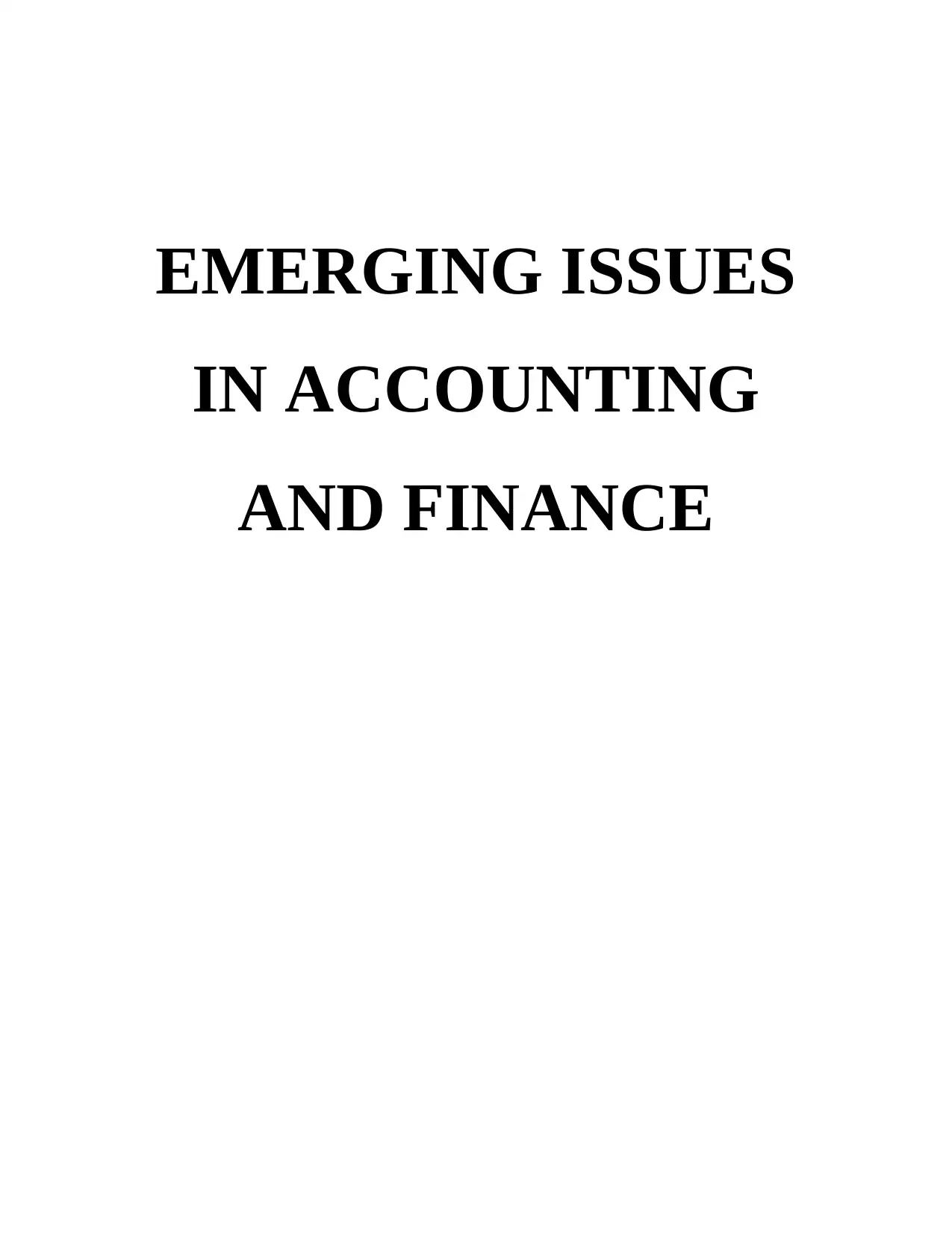
EMERGING ISSUES
IN ACCOUNTING
AND FINANCE
IN ACCOUNTING
AND FINANCE
Paraphrase This Document
Need a fresh take? Get an instant paraphrase of this document with our AI Paraphraser
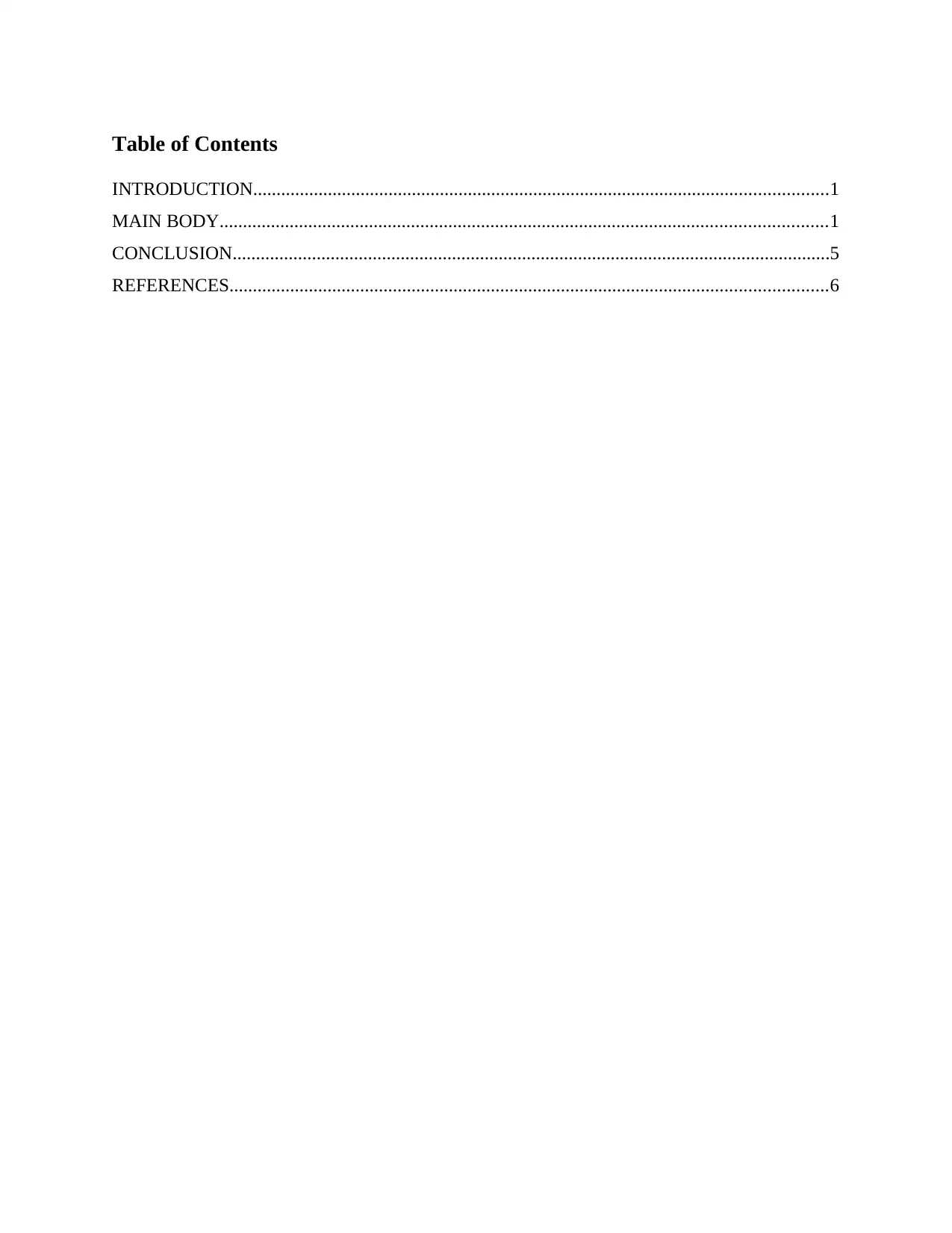
Table of Contents
INTRODUCTION...........................................................................................................................1
MAIN BODY..................................................................................................................................1
CONCLUSION................................................................................................................................5
REFERENCES................................................................................................................................6
INTRODUCTION...........................................................................................................................1
MAIN BODY..................................................................................................................................1
CONCLUSION................................................................................................................................5
REFERENCES................................................................................................................................6
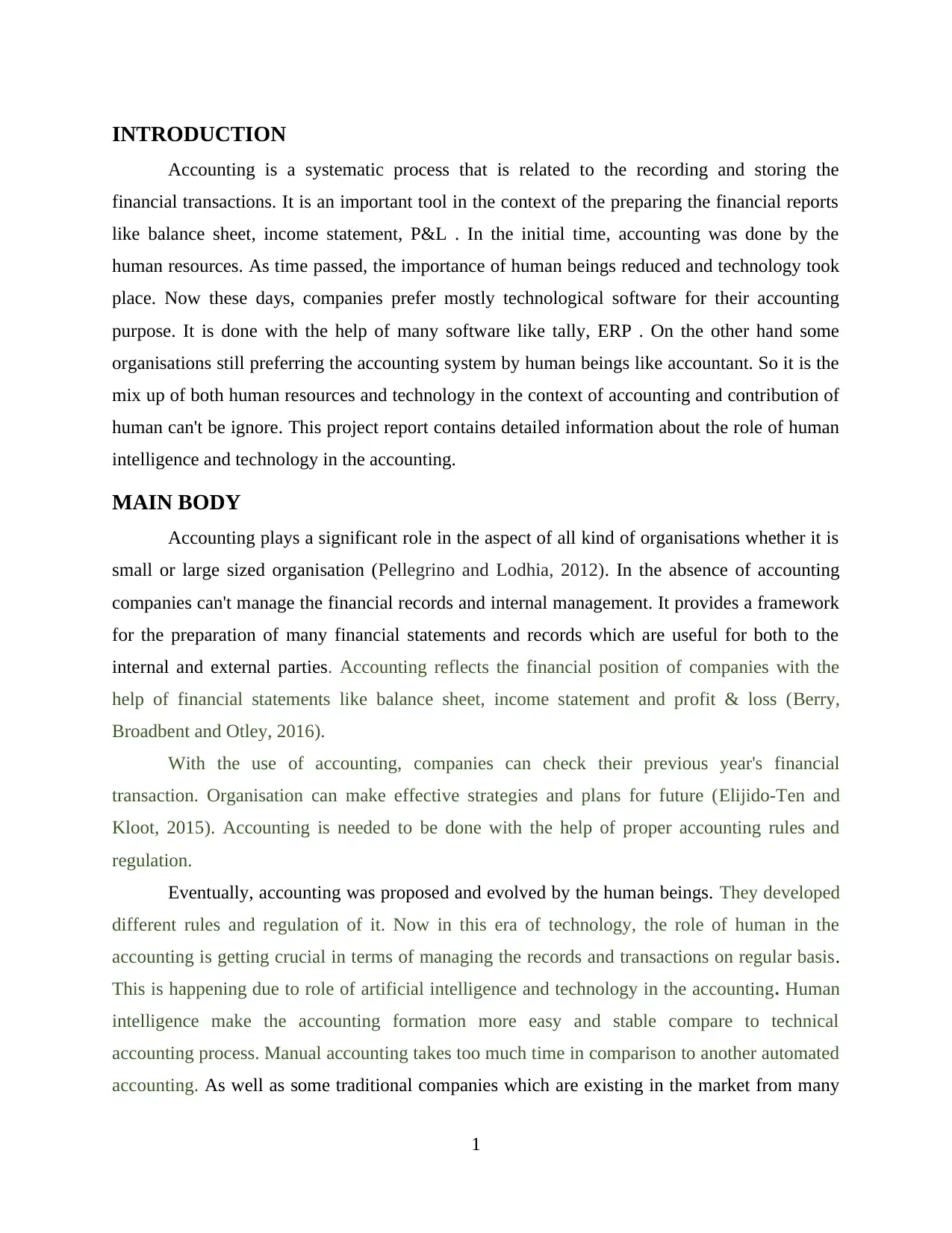
INTRODUCTION
Accounting is a systematic process that is related to the recording and storing the
financial transactions. It is an important tool in the context of the preparing the financial reports
like balance sheet, income statement, P&L . In the initial time, accounting was done by the
human resources. As time passed, the importance of human beings reduced and technology took
place. Now these days, companies prefer mostly technological software for their accounting
purpose. It is done with the help of many software like tally, ERP . On the other hand some
organisations still preferring the accounting system by human beings like accountant. So it is the
mix up of both human resources and technology in the context of accounting and contribution of
human can't be ignore. This project report contains detailed information about the role of human
intelligence and technology in the accounting.
MAIN BODY
Accounting plays a significant role in the aspect of all kind of organisations whether it is
small or large sized organisation (Pellegrino and Lodhia, 2012). In the absence of accounting
companies can't manage the financial records and internal management. It provides a framework
for the preparation of many financial statements and records which are useful for both to the
internal and external parties. Accounting reflects the financial position of companies with the
help of financial statements like balance sheet, income statement and profit & loss (Berry,
Broadbent and Otley, 2016).
With the use of accounting, companies can check their previous year's financial
transaction. Organisation can make effective strategies and plans for future (Elijido-Ten and
Kloot, 2015). Accounting is needed to be done with the help of proper accounting rules and
regulation.
Eventually, accounting was proposed and evolved by the human beings. They developed
different rules and regulation of it. Now in this era of technology, the role of human in the
accounting is getting crucial in terms of managing the records and transactions on regular basis.
This is happening due to role of artificial intelligence and technology in the accounting. Human
intelligence make the accounting formation more easy and stable compare to technical
accounting process. Manual accounting takes too much time in comparison to another automated
accounting. As well as some traditional companies which are existing in the market from many
1
Accounting is a systematic process that is related to the recording and storing the
financial transactions. It is an important tool in the context of the preparing the financial reports
like balance sheet, income statement, P&L . In the initial time, accounting was done by the
human resources. As time passed, the importance of human beings reduced and technology took
place. Now these days, companies prefer mostly technological software for their accounting
purpose. It is done with the help of many software like tally, ERP . On the other hand some
organisations still preferring the accounting system by human beings like accountant. So it is the
mix up of both human resources and technology in the context of accounting and contribution of
human can't be ignore. This project report contains detailed information about the role of human
intelligence and technology in the accounting.
MAIN BODY
Accounting plays a significant role in the aspect of all kind of organisations whether it is
small or large sized organisation (Pellegrino and Lodhia, 2012). In the absence of accounting
companies can't manage the financial records and internal management. It provides a framework
for the preparation of many financial statements and records which are useful for both to the
internal and external parties. Accounting reflects the financial position of companies with the
help of financial statements like balance sheet, income statement and profit & loss (Berry,
Broadbent and Otley, 2016).
With the use of accounting, companies can check their previous year's financial
transaction. Organisation can make effective strategies and plans for future (Elijido-Ten and
Kloot, 2015). Accounting is needed to be done with the help of proper accounting rules and
regulation.
Eventually, accounting was proposed and evolved by the human beings. They developed
different rules and regulation of it. Now in this era of technology, the role of human in the
accounting is getting crucial in terms of managing the records and transactions on regular basis.
This is happening due to role of artificial intelligence and technology in the accounting. Human
intelligence make the accounting formation more easy and stable compare to technical
accounting process. Manual accounting takes too much time in comparison to another automated
accounting. As well as some traditional companies which are existing in the market from many
1
⊘ This is a preview!⊘
Do you want full access?
Subscribe today to unlock all pages.

Trusted by 1+ million students worldwide
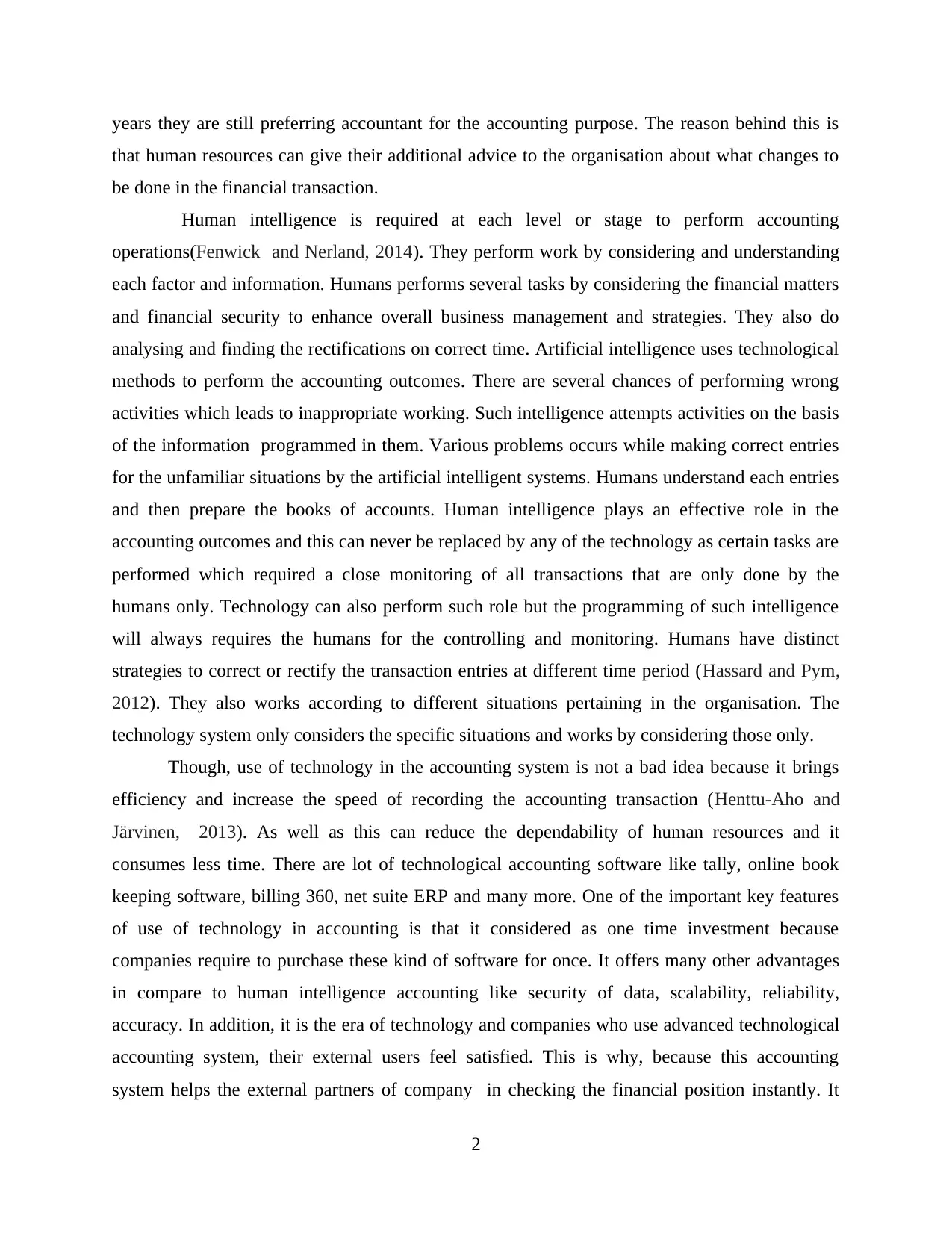
years they are still preferring accountant for the accounting purpose. The reason behind this is
that human resources can give their additional advice to the organisation about what changes to
be done in the financial transaction.
Human intelligence is required at each level or stage to perform accounting
operations(Fenwick and Nerland, 2014). They perform work by considering and understanding
each factor and information. Humans performs several tasks by considering the financial matters
and financial security to enhance overall business management and strategies. They also do
analysing and finding the rectifications on correct time. Artificial intelligence uses technological
methods to perform the accounting outcomes. There are several chances of performing wrong
activities which leads to inappropriate working. Such intelligence attempts activities on the basis
of the information programmed in them. Various problems occurs while making correct entries
for the unfamiliar situations by the artificial intelligent systems. Humans understand each entries
and then prepare the books of accounts. Human intelligence plays an effective role in the
accounting outcomes and this can never be replaced by any of the technology as certain tasks are
performed which required a close monitoring of all transactions that are only done by the
humans only. Technology can also perform such role but the programming of such intelligence
will always requires the humans for the controlling and monitoring. Humans have distinct
strategies to correct or rectify the transaction entries at different time period (Hassard and Pym,
2012). They also works according to different situations pertaining in the organisation. The
technology system only considers the specific situations and works by considering those only.
Though, use of technology in the accounting system is not a bad idea because it brings
efficiency and increase the speed of recording the accounting transaction (Henttu-Aho and
Järvinen, 2013). As well as this can reduce the dependability of human resources and it
consumes less time. There are lot of technological accounting software like tally, online book
keeping software, billing 360, net suite ERP and many more. One of the important key features
of use of technology in accounting is that it considered as one time investment because
companies require to purchase these kind of software for once. It offers many other advantages
in compare to human intelligence accounting like security of data, scalability, reliability,
accuracy. In addition, it is the era of technology and companies who use advanced technological
accounting system, their external users feel satisfied. This is why, because this accounting
system helps the external partners of company in checking the financial position instantly. It
2
that human resources can give their additional advice to the organisation about what changes to
be done in the financial transaction.
Human intelligence is required at each level or stage to perform accounting
operations(Fenwick and Nerland, 2014). They perform work by considering and understanding
each factor and information. Humans performs several tasks by considering the financial matters
and financial security to enhance overall business management and strategies. They also do
analysing and finding the rectifications on correct time. Artificial intelligence uses technological
methods to perform the accounting outcomes. There are several chances of performing wrong
activities which leads to inappropriate working. Such intelligence attempts activities on the basis
of the information programmed in them. Various problems occurs while making correct entries
for the unfamiliar situations by the artificial intelligent systems. Humans understand each entries
and then prepare the books of accounts. Human intelligence plays an effective role in the
accounting outcomes and this can never be replaced by any of the technology as certain tasks are
performed which required a close monitoring of all transactions that are only done by the
humans only. Technology can also perform such role but the programming of such intelligence
will always requires the humans for the controlling and monitoring. Humans have distinct
strategies to correct or rectify the transaction entries at different time period (Hassard and Pym,
2012). They also works according to different situations pertaining in the organisation. The
technology system only considers the specific situations and works by considering those only.
Though, use of technology in the accounting system is not a bad idea because it brings
efficiency and increase the speed of recording the accounting transaction (Henttu-Aho and
Järvinen, 2013). As well as this can reduce the dependability of human resources and it
consumes less time. There are lot of technological accounting software like tally, online book
keeping software, billing 360, net suite ERP and many more. One of the important key features
of use of technology in accounting is that it considered as one time investment because
companies require to purchase these kind of software for once. It offers many other advantages
in compare to human intelligence accounting like security of data, scalability, reliability,
accuracy. In addition, it is the era of technology and companies who use advanced technological
accounting system, their external users feel satisfied. This is why, because this accounting
system helps the external partners of company in checking the financial position instantly. It
2
Paraphrase This Document
Need a fresh take? Get an instant paraphrase of this document with our AI Paraphraser
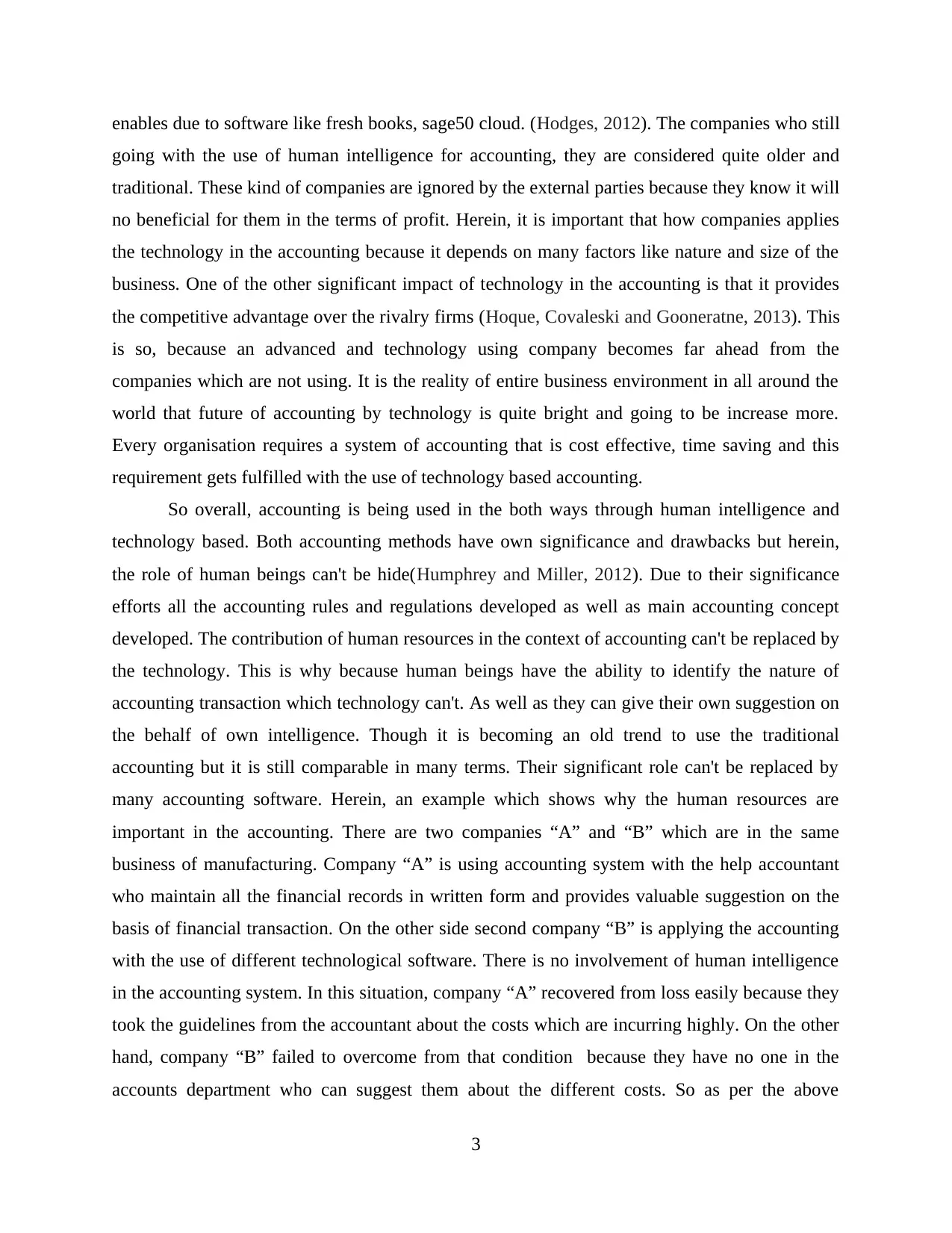
enables due to software like fresh books, sage50 cloud. (Hodges, 2012). The companies who still
going with the use of human intelligence for accounting, they are considered quite older and
traditional. These kind of companies are ignored by the external parties because they know it will
no beneficial for them in the terms of profit. Herein, it is important that how companies applies
the technology in the accounting because it depends on many factors like nature and size of the
business. One of the other significant impact of technology in the accounting is that it provides
the competitive advantage over the rivalry firms (Hoque, Covaleski and Gooneratne, 2013). This
is so, because an advanced and technology using company becomes far ahead from the
companies which are not using. It is the reality of entire business environment in all around the
world that future of accounting by technology is quite bright and going to be increase more.
Every organisation requires a system of accounting that is cost effective, time saving and this
requirement gets fulfilled with the use of technology based accounting.
So overall, accounting is being used in the both ways through human intelligence and
technology based. Both accounting methods have own significance and drawbacks but herein,
the role of human beings can't be hide(Humphrey and Miller, 2012). Due to their significance
efforts all the accounting rules and regulations developed as well as main accounting concept
developed. The contribution of human resources in the context of accounting can't be replaced by
the technology. This is why because human beings have the ability to identify the nature of
accounting transaction which technology can't. As well as they can give their own suggestion on
the behalf of own intelligence. Though it is becoming an old trend to use the traditional
accounting but it is still comparable in many terms. Their significant role can't be replaced by
many accounting software. Herein, an example which shows why the human resources are
important in the accounting. There are two companies “A” and “B” which are in the same
business of manufacturing. Company “A” is using accounting system with the help accountant
who maintain all the financial records in written form and provides valuable suggestion on the
basis of financial transaction. On the other side second company “B” is applying the accounting
with the use of different technological software. There is no involvement of human intelligence
in the accounting system. In this situation, company “A” recovered from loss easily because they
took the guidelines from the accountant about the costs which are incurring highly. On the other
hand, company “B” failed to overcome from that condition because they have no one in the
accounts department who can suggest them about the different costs. So as per the above
3
going with the use of human intelligence for accounting, they are considered quite older and
traditional. These kind of companies are ignored by the external parties because they know it will
no beneficial for them in the terms of profit. Herein, it is important that how companies applies
the technology in the accounting because it depends on many factors like nature and size of the
business. One of the other significant impact of technology in the accounting is that it provides
the competitive advantage over the rivalry firms (Hoque, Covaleski and Gooneratne, 2013). This
is so, because an advanced and technology using company becomes far ahead from the
companies which are not using. It is the reality of entire business environment in all around the
world that future of accounting by technology is quite bright and going to be increase more.
Every organisation requires a system of accounting that is cost effective, time saving and this
requirement gets fulfilled with the use of technology based accounting.
So overall, accounting is being used in the both ways through human intelligence and
technology based. Both accounting methods have own significance and drawbacks but herein,
the role of human beings can't be hide(Humphrey and Miller, 2012). Due to their significance
efforts all the accounting rules and regulations developed as well as main accounting concept
developed. The contribution of human resources in the context of accounting can't be replaced by
the technology. This is why because human beings have the ability to identify the nature of
accounting transaction which technology can't. As well as they can give their own suggestion on
the behalf of own intelligence. Though it is becoming an old trend to use the traditional
accounting but it is still comparable in many terms. Their significant role can't be replaced by
many accounting software. Herein, an example which shows why the human resources are
important in the accounting. There are two companies “A” and “B” which are in the same
business of manufacturing. Company “A” is using accounting system with the help accountant
who maintain all the financial records in written form and provides valuable suggestion on the
basis of financial transaction. On the other side second company “B” is applying the accounting
with the use of different technological software. There is no involvement of human intelligence
in the accounting system. In this situation, company “A” recovered from loss easily because they
took the guidelines from the accountant about the costs which are incurring highly. On the other
hand, company “B” failed to overcome from that condition because they have no one in the
accounts department who can suggest them about the different costs. So as per the above
3
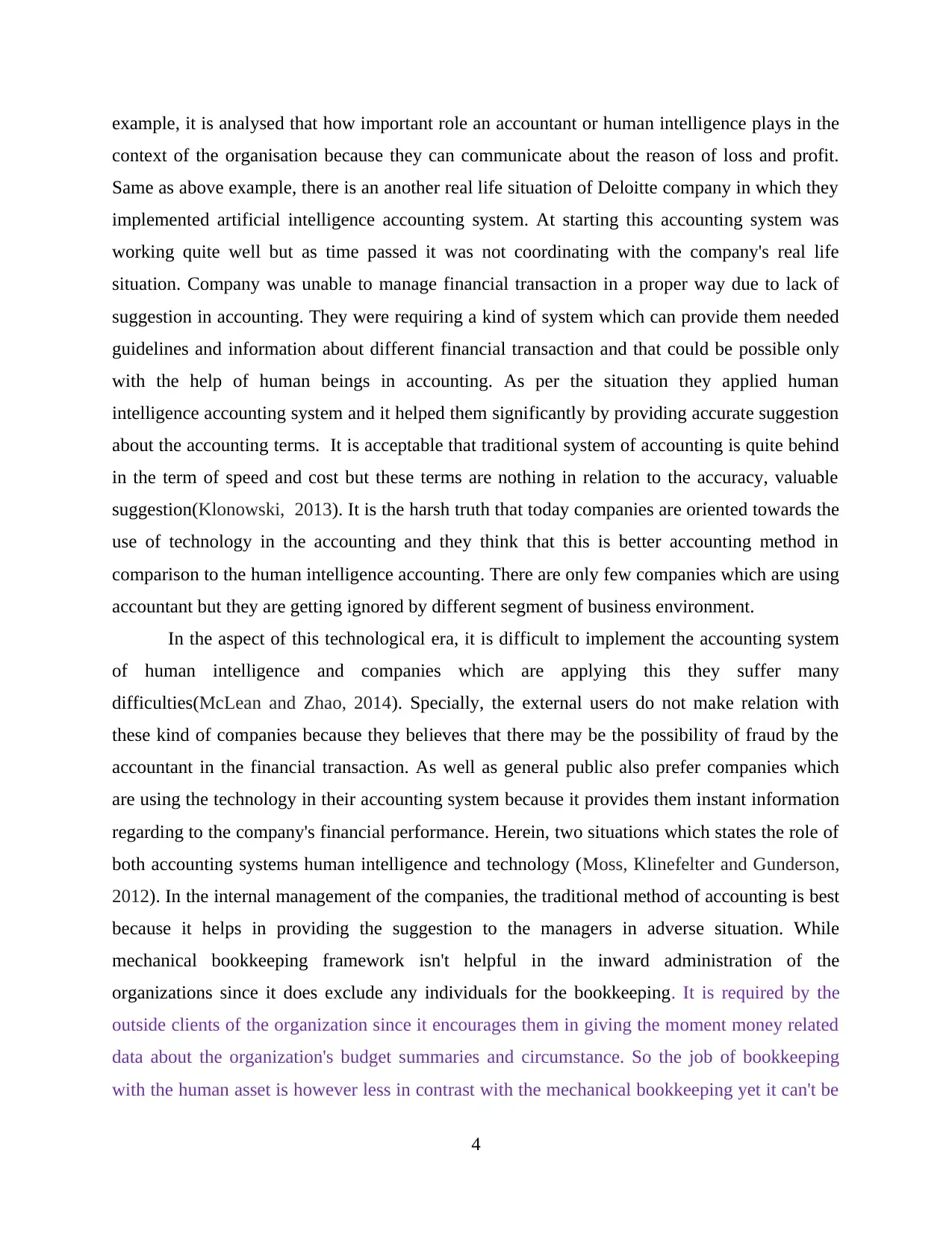
example, it is analysed that how important role an accountant or human intelligence plays in the
context of the organisation because they can communicate about the reason of loss and profit.
Same as above example, there is an another real life situation of Deloitte company in which they
implemented artificial intelligence accounting system. At starting this accounting system was
working quite well but as time passed it was not coordinating with the company's real life
situation. Company was unable to manage financial transaction in a proper way due to lack of
suggestion in accounting. They were requiring a kind of system which can provide them needed
guidelines and information about different financial transaction and that could be possible only
with the help of human beings in accounting. As per the situation they applied human
intelligence accounting system and it helped them significantly by providing accurate suggestion
about the accounting terms. It is acceptable that traditional system of accounting is quite behind
in the term of speed and cost but these terms are nothing in relation to the accuracy, valuable
suggestion(Klonowski, 2013). It is the harsh truth that today companies are oriented towards the
use of technology in the accounting and they think that this is better accounting method in
comparison to the human intelligence accounting. There are only few companies which are using
accountant but they are getting ignored by different segment of business environment.
In the aspect of this technological era, it is difficult to implement the accounting system
of human intelligence and companies which are applying this they suffer many
difficulties(McLean and Zhao, 2014). Specially, the external users do not make relation with
these kind of companies because they believes that there may be the possibility of fraud by the
accountant in the financial transaction. As well as general public also prefer companies which
are using the technology in their accounting system because it provides them instant information
regarding to the company's financial performance. Herein, two situations which states the role of
both accounting systems human intelligence and technology (Moss, Klinefelter and Gunderson,
2012). In the internal management of the companies, the traditional method of accounting is best
because it helps in providing the suggestion to the managers in adverse situation. While
mechanical bookkeeping framework isn't helpful in the inward administration of the
organizations since it does exclude any individuals for the bookkeeping. It is required by the
outside clients of the organization since it encourages them in giving the moment money related
data about the organization's budget summaries and circumstance. So the job of bookkeeping
with the human asset is however less in contrast with the mechanical bookkeeping yet it can't be
4
context of the organisation because they can communicate about the reason of loss and profit.
Same as above example, there is an another real life situation of Deloitte company in which they
implemented artificial intelligence accounting system. At starting this accounting system was
working quite well but as time passed it was not coordinating with the company's real life
situation. Company was unable to manage financial transaction in a proper way due to lack of
suggestion in accounting. They were requiring a kind of system which can provide them needed
guidelines and information about different financial transaction and that could be possible only
with the help of human beings in accounting. As per the situation they applied human
intelligence accounting system and it helped them significantly by providing accurate suggestion
about the accounting terms. It is acceptable that traditional system of accounting is quite behind
in the term of speed and cost but these terms are nothing in relation to the accuracy, valuable
suggestion(Klonowski, 2013). It is the harsh truth that today companies are oriented towards the
use of technology in the accounting and they think that this is better accounting method in
comparison to the human intelligence accounting. There are only few companies which are using
accountant but they are getting ignored by different segment of business environment.
In the aspect of this technological era, it is difficult to implement the accounting system
of human intelligence and companies which are applying this they suffer many
difficulties(McLean and Zhao, 2014). Specially, the external users do not make relation with
these kind of companies because they believes that there may be the possibility of fraud by the
accountant in the financial transaction. As well as general public also prefer companies which
are using the technology in their accounting system because it provides them instant information
regarding to the company's financial performance. Herein, two situations which states the role of
both accounting systems human intelligence and technology (Moss, Klinefelter and Gunderson,
2012). In the internal management of the companies, the traditional method of accounting is best
because it helps in providing the suggestion to the managers in adverse situation. While
mechanical bookkeeping framework isn't helpful in the inward administration of the
organizations since it does exclude any individuals for the bookkeeping. It is required by the
outside clients of the organization since it encourages them in giving the moment money related
data about the organization's budget summaries and circumstance. So the job of bookkeeping
with the human asset is however less in contrast with the mechanical bookkeeping yet it can't be
4
⊘ This is a preview!⊘
Do you want full access?
Subscribe today to unlock all pages.

Trusted by 1+ million students worldwide
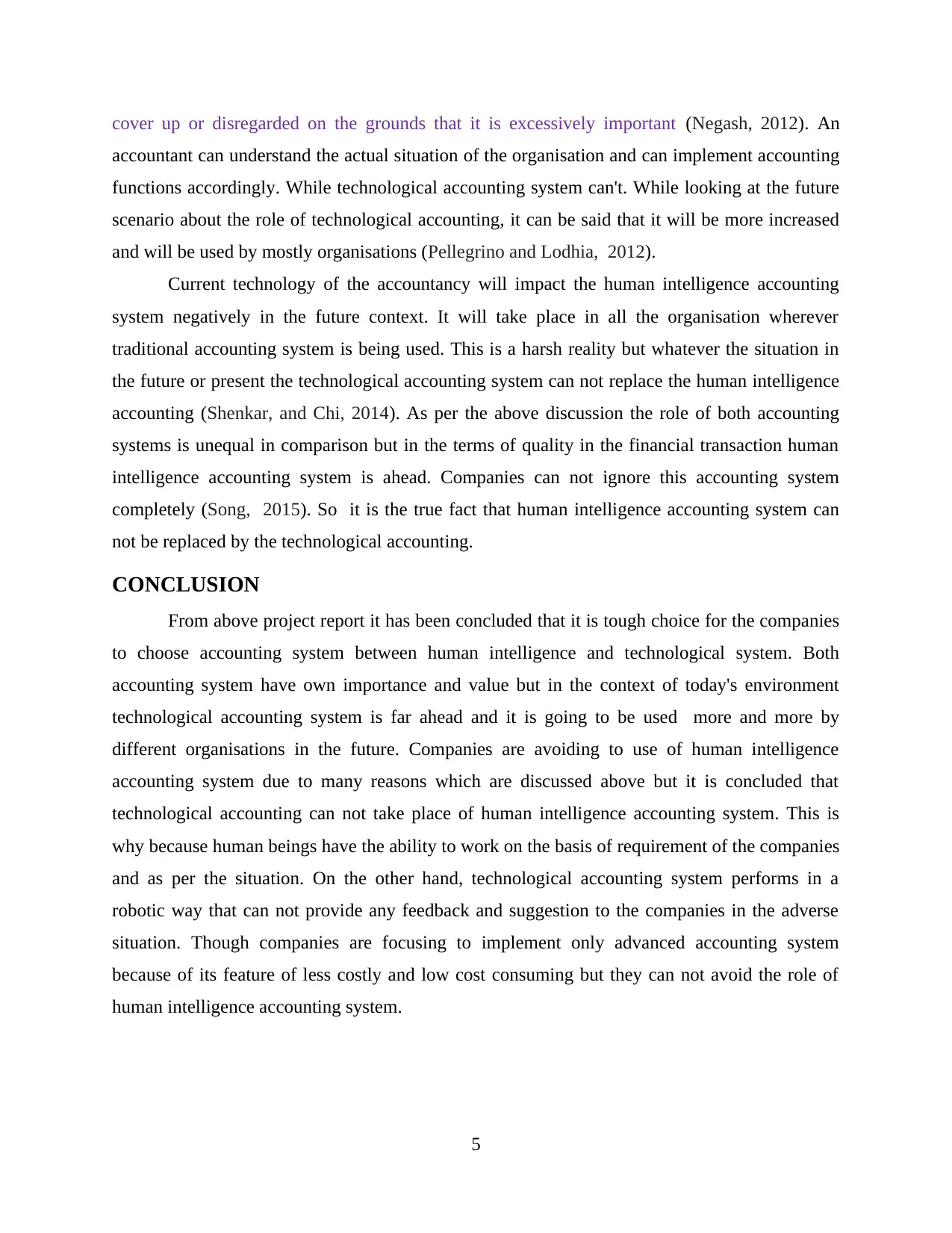
cover up or disregarded on the grounds that it is excessively important (Negash, 2012). An
accountant can understand the actual situation of the organisation and can implement accounting
functions accordingly. While technological accounting system can't. While looking at the future
scenario about the role of technological accounting, it can be said that it will be more increased
and will be used by mostly organisations (Pellegrino and Lodhia, 2012).
Current technology of the accountancy will impact the human intelligence accounting
system negatively in the future context. It will take place in all the organisation wherever
traditional accounting system is being used. This is a harsh reality but whatever the situation in
the future or present the technological accounting system can not replace the human intelligence
accounting (Shenkar, and Chi, 2014). As per the above discussion the role of both accounting
systems is unequal in comparison but in the terms of quality in the financial transaction human
intelligence accounting system is ahead. Companies can not ignore this accounting system
completely (Song, 2015). So it is the true fact that human intelligence accounting system can
not be replaced by the technological accounting.
CONCLUSION
From above project report it has been concluded that it is tough choice for the companies
to choose accounting system between human intelligence and technological system. Both
accounting system have own importance and value but in the context of today's environment
technological accounting system is far ahead and it is going to be used more and more by
different organisations in the future. Companies are avoiding to use of human intelligence
accounting system due to many reasons which are discussed above but it is concluded that
technological accounting can not take place of human intelligence accounting system. This is
why because human beings have the ability to work on the basis of requirement of the companies
and as per the situation. On the other hand, technological accounting system performs in a
robotic way that can not provide any feedback and suggestion to the companies in the adverse
situation. Though companies are focusing to implement only advanced accounting system
because of its feature of less costly and low cost consuming but they can not avoid the role of
human intelligence accounting system.
5
accountant can understand the actual situation of the organisation and can implement accounting
functions accordingly. While technological accounting system can't. While looking at the future
scenario about the role of technological accounting, it can be said that it will be more increased
and will be used by mostly organisations (Pellegrino and Lodhia, 2012).
Current technology of the accountancy will impact the human intelligence accounting
system negatively in the future context. It will take place in all the organisation wherever
traditional accounting system is being used. This is a harsh reality but whatever the situation in
the future or present the technological accounting system can not replace the human intelligence
accounting (Shenkar, and Chi, 2014). As per the above discussion the role of both accounting
systems is unequal in comparison but in the terms of quality in the financial transaction human
intelligence accounting system is ahead. Companies can not ignore this accounting system
completely (Song, 2015). So it is the true fact that human intelligence accounting system can
not be replaced by the technological accounting.
CONCLUSION
From above project report it has been concluded that it is tough choice for the companies
to choose accounting system between human intelligence and technological system. Both
accounting system have own importance and value but in the context of today's environment
technological accounting system is far ahead and it is going to be used more and more by
different organisations in the future. Companies are avoiding to use of human intelligence
accounting system due to many reasons which are discussed above but it is concluded that
technological accounting can not take place of human intelligence accounting system. This is
why because human beings have the ability to work on the basis of requirement of the companies
and as per the situation. On the other hand, technological accounting system performs in a
robotic way that can not provide any feedback and suggestion to the companies in the adverse
situation. Though companies are focusing to implement only advanced accounting system
because of its feature of less costly and low cost consuming but they can not avoid the role of
human intelligence accounting system.
5
Paraphrase This Document
Need a fresh take? Get an instant paraphrase of this document with our AI Paraphraser
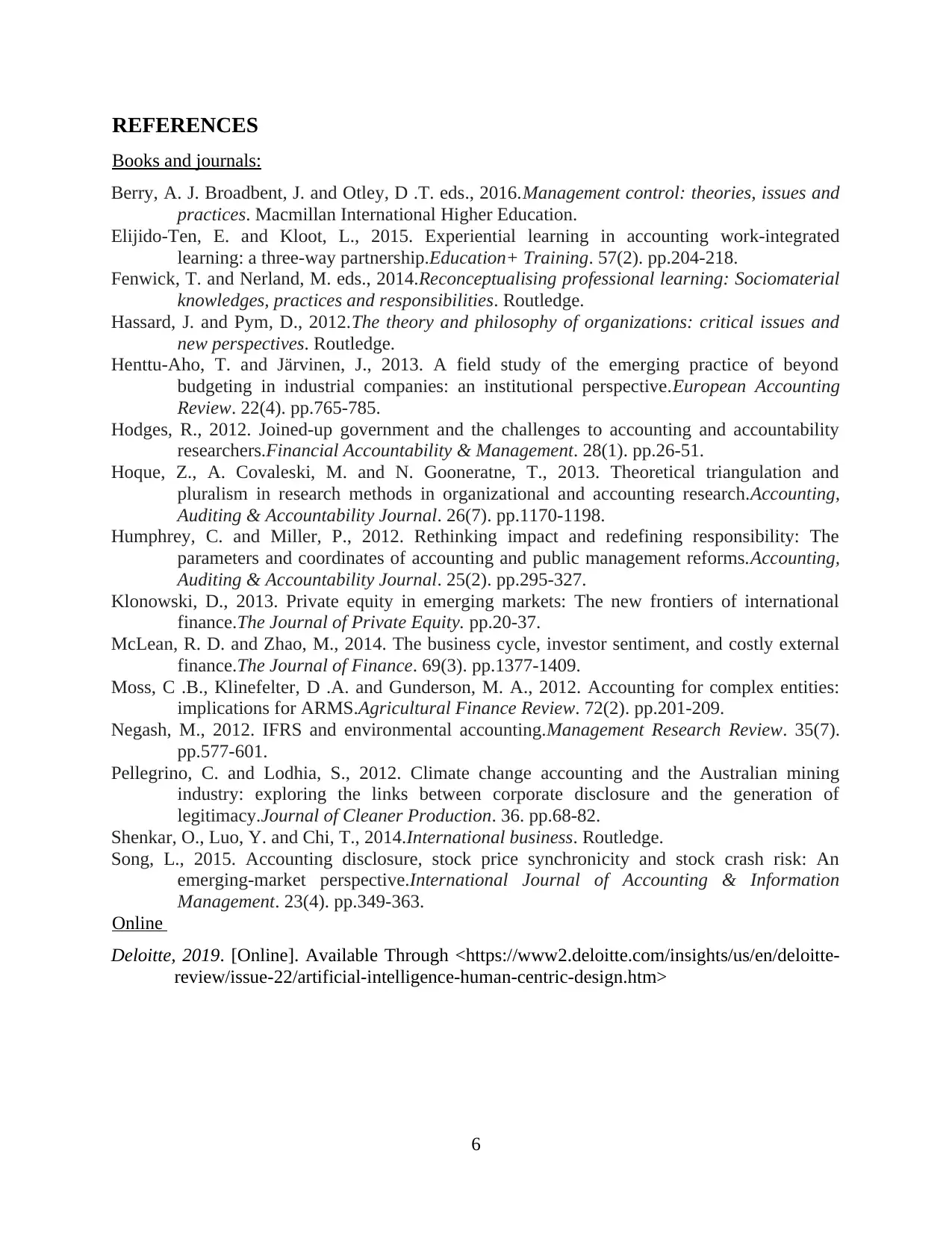
REFERENCES
Books and journals:
Berry, A. J. Broadbent, J. and Otley, D .T. eds., 2016.Management control: theories, issues and
practices. Macmillan International Higher Education.
Elijido-Ten, E. and Kloot, L., 2015. Experiential learning in accounting work-integrated
learning: a three-way partnership.Education+ Training. 57(2). pp.204-218.
Fenwick, T. and Nerland, M. eds., 2014.Reconceptualising professional learning: Sociomaterial
knowledges, practices and responsibilities. Routledge.
Hassard, J. and Pym, D., 2012.The theory and philosophy of organizations: critical issues and
new perspectives. Routledge.
Henttu-Aho, T. and Järvinen, J., 2013. A field study of the emerging practice of beyond
budgeting in industrial companies: an institutional perspective.European Accounting
Review. 22(4). pp.765-785.
Hodges, R., 2012. Joined‐up government and the challenges to accounting and accountability
researchers.Financial Accountability & Management. 28(1). pp.26-51.
Hoque, Z., A. Covaleski, M. and N. Gooneratne, T., 2013. Theoretical triangulation and
pluralism in research methods in organizational and accounting research.Accounting,
Auditing & Accountability Journal. 26(7). pp.1170-1198.
Humphrey, C. and Miller, P., 2012. Rethinking impact and redefining responsibility: The
parameters and coordinates of accounting and public management reforms.Accounting,
Auditing & Accountability Journal. 25(2). pp.295-327.
Klonowski, D., 2013. Private equity in emerging markets: The new frontiers of international
finance.The Journal of Private Equity. pp.20-37.
McLean, R. D. and Zhao, M., 2014. The business cycle, investor sentiment, and costly external
finance.The Journal of Finance. 69(3). pp.1377-1409.
Moss, C .B., Klinefelter, D .A. and Gunderson, M. A., 2012. Accounting for complex entities:
implications for ARMS.Agricultural Finance Review. 72(2). pp.201-209.
Negash, M., 2012. IFRS and environmental accounting.Management Research Review. 35(7).
pp.577-601.
Pellegrino, C. and Lodhia, S., 2012. Climate change accounting and the Australian mining
industry: exploring the links between corporate disclosure and the generation of
legitimacy.Journal of Cleaner Production. 36. pp.68-82.
Shenkar, O., Luo, Y. and Chi, T., 2014.International business. Routledge.
Song, L., 2015. Accounting disclosure, stock price synchronicity and stock crash risk: An
emerging-market perspective.International Journal of Accounting & Information
Management. 23(4). pp.349-363.
Online
Deloitte, 2019. [Online]. Available Through <https://www2.deloitte.com/insights/us/en/deloitte-
review/issue-22/artificial-intelligence-human-centric-design.htm>
6
Books and journals:
Berry, A. J. Broadbent, J. and Otley, D .T. eds., 2016.Management control: theories, issues and
practices. Macmillan International Higher Education.
Elijido-Ten, E. and Kloot, L., 2015. Experiential learning in accounting work-integrated
learning: a three-way partnership.Education+ Training. 57(2). pp.204-218.
Fenwick, T. and Nerland, M. eds., 2014.Reconceptualising professional learning: Sociomaterial
knowledges, practices and responsibilities. Routledge.
Hassard, J. and Pym, D., 2012.The theory and philosophy of organizations: critical issues and
new perspectives. Routledge.
Henttu-Aho, T. and Järvinen, J., 2013. A field study of the emerging practice of beyond
budgeting in industrial companies: an institutional perspective.European Accounting
Review. 22(4). pp.765-785.
Hodges, R., 2012. Joined‐up government and the challenges to accounting and accountability
researchers.Financial Accountability & Management. 28(1). pp.26-51.
Hoque, Z., A. Covaleski, M. and N. Gooneratne, T., 2013. Theoretical triangulation and
pluralism in research methods in organizational and accounting research.Accounting,
Auditing & Accountability Journal. 26(7). pp.1170-1198.
Humphrey, C. and Miller, P., 2012. Rethinking impact and redefining responsibility: The
parameters and coordinates of accounting and public management reforms.Accounting,
Auditing & Accountability Journal. 25(2). pp.295-327.
Klonowski, D., 2013. Private equity in emerging markets: The new frontiers of international
finance.The Journal of Private Equity. pp.20-37.
McLean, R. D. and Zhao, M., 2014. The business cycle, investor sentiment, and costly external
finance.The Journal of Finance. 69(3). pp.1377-1409.
Moss, C .B., Klinefelter, D .A. and Gunderson, M. A., 2012. Accounting for complex entities:
implications for ARMS.Agricultural Finance Review. 72(2). pp.201-209.
Negash, M., 2012. IFRS and environmental accounting.Management Research Review. 35(7).
pp.577-601.
Pellegrino, C. and Lodhia, S., 2012. Climate change accounting and the Australian mining
industry: exploring the links between corporate disclosure and the generation of
legitimacy.Journal of Cleaner Production. 36. pp.68-82.
Shenkar, O., Luo, Y. and Chi, T., 2014.International business. Routledge.
Song, L., 2015. Accounting disclosure, stock price synchronicity and stock crash risk: An
emerging-market perspective.International Journal of Accounting & Information
Management. 23(4). pp.349-363.
Online
Deloitte, 2019. [Online]. Available Through <https://www2.deloitte.com/insights/us/en/deloitte-
review/issue-22/artificial-intelligence-human-centric-design.htm>
6
1 out of 8
Related Documents
Your All-in-One AI-Powered Toolkit for Academic Success.
+13062052269
info@desklib.com
Available 24*7 on WhatsApp / Email
![[object Object]](/_next/static/media/star-bottom.7253800d.svg)
Unlock your academic potential
Copyright © 2020–2026 A2Z Services. All Rights Reserved. Developed and managed by ZUCOL.





